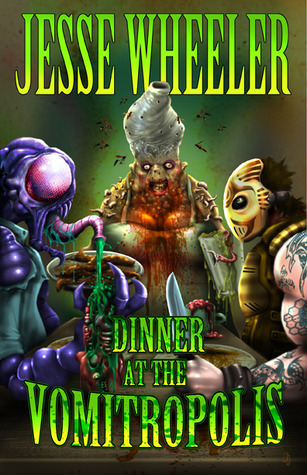by Joshua Skye:
Let’s just get it out of the way, shall we? I had a pretty good idea what I was getting myself into when I purchased a book titled “Dinner at the Vomitropolis.” This wasn’t going to be high-art, tasteful in any respect, or even some low-brow attempt at emotional reverence. This was pure smut, trash for amusement’s sake. I knew I wasn’t going to walk away from this book changed in some significant way. I just wanted to see if it lived up to its promise. Call it: morbid curiosity.
The book is actually an anthology, three gross-out tales in one nauseating volume by a relative newcomer. Suspiciously glowing reviews on Amazon suggest Wheeler to be some sort of seasoned literary genius. One reviewer claims he’s devoured everything Wheeler has ever written, but the reality is this author hasn’t been around very long, and he hasn’t actually written very much. His scant work can only be found in one place, anthologies from StrangeHouse Books. Does his work live up to the praise? Let’s see, shall we?
The first story, “Mass Digestion,” is a stomach-churning account of a morbidly obese man’s encounter with a swarming mass of flesh-eating insects and two meth-head thieves. The paper-thin, rather irrational story (a robber returns after finding out there was nothing to steal, why?) is beside the point. There’s also no reason given for why anything happens in this tale. It’s not necessarily a bad thing, some horror stories are best kept mysterious, but some readers will be irked by the lack of explanation here. But let’s focus on the primary goal of this tome. It’s all about the queasy factor. “Mass Digestion” succeeds admirably, however I have to reveal the author’s glaring weakness.
The story is bogged down by a tedious amount of repetition that very nearly became insulting. Readers aren’t stupid, nor are they so absentminded that they would forget the action from one paragraph to the next. The happenings were endlessly reiterated. The shortcoming was most irritating when the author ran out of words to describe the action thus repeating not only what was going on, but often describing it in exactly the same way sentence after sentence. The bones of a good story were there, but honestly it needed a little work and a firm editor. It could have been a great grotesque narrative, but what we have is just an okay start to this still promising anthology. I hope it gets better.
What’s next on the menu, sir?
“Gross-Out Gladiators” is the second course. Out in the middle of an endless desert there is a gathering of the world’s wealthiest elites, politicians, celebrities, and other eccentrics wallowing in the vilest grotesquery imaginable while wreathing a filthy vomit-inducing competition. Inter-spliced with those disgusting shenanigans is the woeful tale of a kidnapped virgin-turned-honey-slut trying to escape her insect-fetishist captor. This is pure adolescent trash designed for one thing, to gross the reader out. Guess what? It does just that. Unfortunately, the skill present in the previous story isn’t here, the writing is bad, the rambling scribbles of a teenager amused by simple vulgarities. There are plot holes you could drive a septic tank through, and inconsistencies abound. There’s simply no reason for there to be contradictions in the space of a few paragraphs, I don’t care what the genre is or even who the author is. It’s inexcusable. The climax of the tale is marred by many grammatical errors, and the rushed, convenient, and idiotic conclusion negates the entire plight of the story. What a monumental disappointment.
A word of caution Mr. Wheeler, if you’re going to bash the work of another artist in the confines of your story, even if she works in another medium, you’d best make damn sure the quality of your work is better, otherwise your joke is on you.
With the promise gone, what’s next?
The third puke-fest is called “Gagging Tess,” an infantile play on the title of what just happens to be one of my favorite movies (“Guarding Tess” starring Shirley MacLaine). With the allure of this tome practically dead, I plunge into the final story hoping Wheeler redeems himself, even if it’s only in some small way. He doesn’t. The story slips dangerously into the taboo realms of pedophilia, in fact it was revoltingly reminiscent of the more depraved scenes in “The End of Alice.” And not in a good way!
Where A.M. Homes succeeds, Wheeler fails miserably. Homes knows how to write and even how to manipulate a connection with the most contemptible of characters. Wheeler is all shock value and no depth, pretense and show without any redeeming qualities whatsoever. He tries to disguise graphic depictions of pedophilia, but it’s very clear what’s unfolding. It’s poorly veiled, badly written innuendo.
“Gagging Tess” isn’t just another Wheeler tale of puke and shit, it’s an ugly depiction of child abuse on an epic level. The usual bobs and whistles he’s fixated on are so rampant that they lose any shred of impact. He’s clearly aware of this, and therefore took it one step further by writing an ill-conceived allegory for incestuous child-rape. His work is shallow and, in spite of itself, completely forgettable.
Wheeler does a lot of head-hopping in his tales, a forgivable mistake for first-time authors (we’ve all done it) but a flaw some readers might not be so willing to overlook. Unnecessary, nearly insolent repetition, an absolute lack of character development, a prevailing pre-pubescent mentality, and a spewing of plot holes and other inconsistencies hold his work back. Yes, we all know the stories are supposed to be weird and nauseating, but they can still give us characters we care about, be well-written, and be coherent and cohesive within their own framework. It doesn’t just have to be third-grade chunkage-spewing slapstick with F-Bombs and sex.
I’ll dare guess his target audience won’t mind his shortcomings, as I stated before this isn’t high-art and no one’s going to expect it to be. Still, it could have transcended the mere expectations of the title and perhaps reached beyond the core audience to a wider readership as a few of Wheeler’s forefathers and contemporaries have done.
Sadly, with “Dinner at the Vomitropolis” Jesse Wheeler seems to have strived for mediocrity. He almost succeeded. Easygoing fans of the genre might like it. For the discriminating reader, even bizarro enthusiasts, this is 1-star material all the way. I very much question the validity of those 5-star reviews. As for me, I was entertained, just barely, in a childishly inquisitive kind of way. I did read the entire thing and the cover art is pretty cool, but that doesn’t mean the outing is actually any good. My 1-star rating is very generous. Whether or not you’ll like it is not only a matter of personal taste, but dependent on how much you’re willing to forgive an author (and editor). If you are merely curious about bizarro, there are much better examples of this genre to choose from.






 Let’s just get it out of the way, shall we? I had a pretty good idea what I was getting myself into when I purchased a book titled “Dinner at the Vomitropolis.” This wasn’t going to be high-art, tasteful in any respect, or even some low-brow attempt at emotional reverence. This was pure smut, trash for amusement’s sake. I knew I wasn’t going to walk away from this book changed in some significant way. I just wanted to see if it lived up to its promise. Call it: morbid curiosity.
Let’s just get it out of the way, shall we? I had a pretty good idea what I was getting myself into when I purchased a book titled “Dinner at the Vomitropolis.” This wasn’t going to be high-art, tasteful in any respect, or even some low-brow attempt at emotional reverence. This was pure smut, trash for amusement’s sake. I knew I wasn’t going to walk away from this book changed in some significant way. I just wanted to see if it lived up to its promise. Call it: morbid curiosity.









Comments are closed.